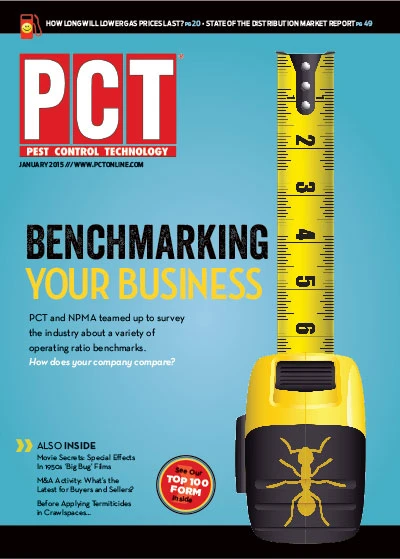 At some point in their business careers, owners who decide to sell their company are faced with one of the most significant and life-changing decisions they can make. So it’s not only logical, but also vital they get the right advice that will help them to profitably and psychologically achieve their goals.
At some point in their business careers, owners who decide to sell their company are faced with one of the most significant and life-changing decisions they can make. So it’s not only logical, but also vital they get the right advice that will help them to profitably and psychologically achieve their goals.
Ifs, Whens and Hows.
“If you’re a successful PCO,” said Dan Gordon, CPA and president of PCO Bookkeepers, Newton, N.J., “you’re generally very good at managing the day-to-day operations of your business, such as new business development, employee recruitment, sales and marketing, technician training, and financial management. But none of these skills are particularly useful when trying to determine if, when and how you sell your company. Do you know the ways to structure a deal, to maximize the value of your company, to determine what it will take for you to retire comfortably, and to transition successfully to your new life following the sale?”
According to Gordon and John P. Corrigan, Esq., of the law firm Corrigan & Baker, in White Plains, N.Y., answers to these questions require a good mix of tax planning, financial planning and estate planning, as well as various family-planning skills. The two stressed the importance of consulting qualified advisers who specialize in M&A structuring. “These professionals can be expensive, so we recommend that you have a strong awareness of the planning aspects in order to communicate your vision to them before you seek out their advice,” said Gordon.
Pertinent Planning.
“The first step in the M&A journey requires you having, understanding and providing pertinent information,” Gordon said. “You have to present that information to a potential buyer who will then do an analysis in order to come up with an offering price. That requires quite a bit of planning on your part.” To do that planning Gordon and Corrigan say you need a CPA to understand and communicate the tax ramifications to you, an attorney to structure the deal and draft an appropriate contract, and a business broker or intermediary to seek out buyers and negotiate a deal. In other words, you need a “dream team” of advisers focused on maximizing the value of your company in order to sell it to a third party or to pass it on to the next generation of your family.
“There are psychological aspects to consider too,” Corrigan said. “There’s no simple formula to this effort as every individual is unique. When do you want to retire? Do you really like or love the pest control business? At what stage in your life do you decide to sell? If you sell, how will this affect your life, and the lives of your spouse and children? Do you have health issues? You need to answer those questions and create the best orchestrated plan in order to move ahead.”
Maximizing Value.
Exploring the subject of maximizing the value of your company, Gordon and Corrigan put forward the following basic question: “If you put together a five-year plan to increase the purchase price you want, what must you do to achieve that objective?”
They say it’s all about recurring revenues. “You’re in the service contract business and within this business there are certain niches,” stated Gordon. “Are your main customers commercial businesses or residential customers? Do you specialize in wood-destroying pests? Knowing just who you are will help you build up that niche. If you’re doing $2 million in business today and want to reach $5 million when you sell several years down the line, you need an aggressive but achievable business, sales and marketing plan to increase the number of service contracts you own.”
Five-Year Goal.
“You’ve got to add revenues to achieve your five-year goal, but they must be profitable revenues — anything else is to your detriment. Maximizing the value of your company is really about gross profit margins and not about gross revenues. A strategic buyer understands this and is looking closely at the key costs of doing business,” Gordon said.
“What’s the current supply and demand situation for buyers? Right now it’s a seller’s market. Buyers flush with cash are looking to improve their footprint,” he said.
In valuing your business, an experienced business broker can help, said Corrigan. “But you don’t want to go to a certified business valuating analyst — the person who would value a business for divorce purposes, or for estate planning reasons. These people use established techniques to value a business. But now the pest control industry market is dictating a much higher multiple than what those professionals would conclude as part of a formal appraisal so you need to know the true market value of your business. The three approaches to learning this include multiples of earnings, revenues and prices based on market comps, i.e. similar sales. That will tell you what your company is worth: 1.0 times revenues, 1.5 times revenues, 1.7 times revenues, etc.”
Two Examples.
Gordon cited two companies as examples: One had $1 million in revenue with five technicians and the other had $1 million in revenue with 10 technicians. Which of the two is more valuable? Clearly, the company with five technicians because they are much more profitable given the total compensation cost is likely to be less for five employees vs. 10 employees. Would you value these companies the same based on a multiple of revenues? The answer is not so obvious: you need to dig down to determine what those costs really are in creating the gross revenue stream.
Both experts said assembling a great team of employees — if your company is of a decent size — may generate interest on the part of a purchaser who may want to retain those employees. If you have established a better image and brand in the community, that difference in recognition might be a very attractive factor to a potential purchaser, they explained.
Gordon visualizes the pest control business as two circles: an income circle and a wealth circle. The income circle includes your revenues. The wealth circle is your pot of gold at the end of the rainbow. “You build that wealth circle through recurring services,” he said.
Corrigan advised against thinking only about getting the highest purchase price. “Tax minimization must be explored carefully,” he said. “Ignoring that aspect could make a big, negative difference in the profit you’ll make on your sale.”
Risks of Procrastination.
Before you sell, Gordon suggests you determine the risks of procrastination — putting off your decision to sell. What if your company has large three-year contracts and you’re coming up to that third year? You might not be able to renew those contracts, so timing is important if you consider how a potential purchaser would evaluate this information.
“If you’re thinking of selling to your family, are your children likely candidates?” he asked. “If you have more than one child, whom will you choose to be CEO and who will be in charge of other various functional areas? Will those decisions create in-fighting among them?”
The two also advised to carefully consider what you will do after your company is sold. Do you want to retire? Travel? Become involved in philanthropic endeavors? Do you want to work for the buyer? Or do you want to start a new career in a different industry? In other words, what are your lifestyle needs?
The author is a freelance writer based in Milwaukee. Contact him via email at jfox@giemedia.com.

Explore the January 2015 Issue
Check out more from this issue and find your next story to read.
Latest from Pest Control Technology
- Rentokil Terminix Expanded in Key Markets with 2024 Acquisitions
- In Memoriam: Joe Cavender
- Certus Acquires Green Wave Pest Solutions
- Liphatech Adds Alex Blahnik to Technical Team
- Do the Right Sting: Stinging Insect Identification, Management, and Safety
- VAGA's 8th Annual Veterans Thanksgiving Appreciation Dinner
- Clark's Blair Smith on the Response to Increased Dengue Fever Cases in Southern California
- WSDA, USDA Announce Eradication of Northern Giant Hornet from U.S.





